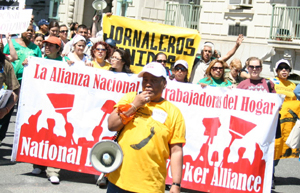Editor's Note: One unique aspect of the Labor Notes Conference is the special meetings that allow far-flung activists to gather and share information on a rare cross-union basis. This year's April 23-25 conference in Detroit will feature a daylong meeting of those involved in organizing and representing home-based workers—challenging work undertaken in the absence of a common workplace. If you'd like to participate, contact Lsupport [at] aol [dot] com (Steve Early.)
As labor activists, direct care providers, or academic researchers, we have all been involved in aiding or studying organizing work among publicly funded personal care attendants and child care providers, plus other types of domestic workers.
Largely female, people of color, and very often foreign born, these workers have been the largest single source of new union members—more than 500,000 in the last 10 years.
We believe that the work done by SEIU, AFSCME, AFT, CWA, UAW, and OPEIU to create new bargaining units among direct care workers—often previously classified as “independent contractors”—strengthens on-going efforts by the National Domestic Workers Alliance to win new legal rights and protections for privately-employed home-based workers as well.
In recent months, however, adequate funding for home health services in California and other states has been threatened by local budget cuts. Changes in Medicare reimbursement practices—as part of President Obama’s “health care reform”—may also affect these programs adversely. Inter-union competition for home-based workers has intensified in places like Fresno County, California, where the outcome of a vote involving 10,000 home care workers last June is still being contested. In Illinois, 3,000 Illinois workers who provide in-home care for the severely disabled recently voted to reject representation, despite having a choice between two unions on the ballot.
That’s why we think this is a particularly good time to step back and assess our collective efforts to create a “voice-at-work” for home-based workers, while improving the conditions of domestic labor generally. During the weekend of April 23-25, at the Labor Notes conference in Dearborn, Michigan, there will be a wide-ranging discussion of the challenges facing unions and workers centers as they try to build durable, effective, and member-driven organizations among men and women employed in such “non-traditional” workplaces.
We hope many will join us in shaping the agenda for this meeting, helping to publicize it, and participating. On a rare cross-union basis, we will be exchanging information about home-based worker organizing and bargaining, rank-and-file leadership development, other job-related training programs, plus on-going legislative/political campaigns for union recognition and program funding. We hope to learn from each other’s union building successes and setbacks, while identifying “best practices” that might be replicated more widely.
To make suggestions for additional content or speakers at our planned home-based worker panel/workshop at the Labor Notes conference, please contact Steve Early at Lsupport [at] aol [dot] com or 617-930-7327.
You can register now for the overall April 23-25 conference here.
Please share this invitation with union co-workers or academic colleagues in California, Washington, Oregon, Illinois, Michigan, Missouri, New York, New Jersey, Pennsylvania, Massachusetts, or any of the other states where home-based worker organizing has contributed so much to union membership growth in recent years.
Sincerely,
*Steve Early, Labor Notes Policy Committee member and former organizer, CWA District 1
*Ken McNamara, president of CWA Local 1037, Newark, New Jersey
*Ken Allen, Executive Director, AFSCME District Council 75, Portland, Oregon
*Priscilla Gonzalez, Director, Domestic Workers United, New York City
*Barri Boone, home health care aide and member of SEIU Local 6434, Santa Cruz, California
*John Vellardita, organizer, National Union of Healthcare Workers, Oakland, California
*Jennifer Klein, Professor of History, Yale University, and co-author, with Eileen Boris, of Caring For America: How Home Healthcare Workers Became The New Face of Labor
*Dana Simon, organizer, UNITE HERE Local 26, Boston, Mass. and former home-care organizer and negotiator for United Healthcare Workers-West/SEIU
*Wade Rathke, founder of ACORN and chief organizer, ULU Local 100
*Clare Stacey, Assistant Professor, Department of Sociology, Kent State University






![Eight people hold printed signs, many in the yellow/purple SEIU style: "AB 715 = genocide censorship." "Fight back my ass!" "Opposed AB 715: CFA, CFT, ACLU, CTA, CNA... [but not] SEIU." "SEIU CA: Selective + politically safe. Fight back!" "You can't be neutral on a moving train." "When we fight we win! When we're neutral we lose!" Big white signs with black & red letters: "AB 715 censors education on Palestine." "What's next? Censoring education on: Slavery, Queer/Ethnic Studies, Japanese Internment?"](https://labornotes.org/sites/default/files/styles/related_crop/public/main/blogposts/image%20%2818%29.png?itok=rd_RfGjf)
